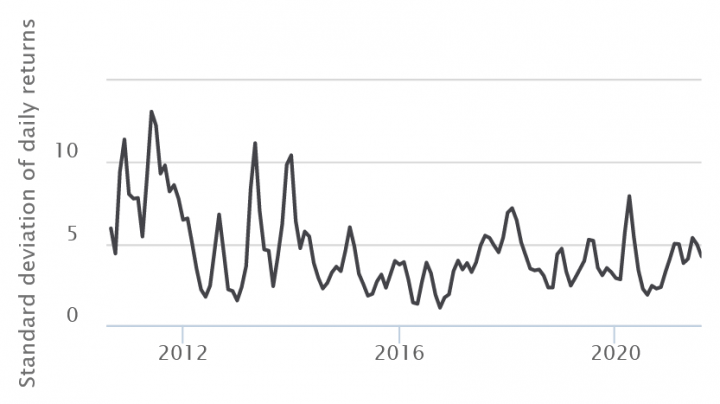4 Big Lies Banks Have Told About Bitcoin
In Recent Years And At The Same Time With Learning Bitcoin And Digital Currencies Around The World, Central Banks, Government Agencies, And International Institutions Have Always Tried To Highlight The Weaknesses Of Bitcoin.
Banks Have Told About Bitcoin, But to what extent are these criticisms true, and for what purpose do organizations raise these issues?
To the Report Crypto News: Central banks still can not properly understand bitcoin in 2021. Although many have called bitcoin a bubble and an unstable asset and rejected the digital currency altogether, bitcoin continues to grow in price, public acceptance, and other critical metrics.
With the widespread growth of Bitcoin prices, central banks have once again slandered this digital currency in recent years. In contrast, these same banks often promote the use of Chinese blockchain technology to develop their national digital currency.
In the following, we will take a closer look at these comments and see what mistakes central banks are making about Bitcoin.
1. Bitcoin is volatile and not suitable for storing value!
The criticism that central banks and a wide range of people are hesitant about bitcoin is that bitcoin is far more unstable than it can be as a tool for storing value.
For example, Jerome Powell, the head of the central bank America, In March of this year and during an event held by the International Settlement Bank, said:
Digital currencies [like bitcoin], which we call digital assets, are volatile and therefore not really useful as a store of value.
Many long-term investors reject the theory that bitcoin can be used as a store of value. Bitcoin prices can be really volatile in the short term, but those who buy their bitcoins from start to finish Howling cycles(Almost every 4 years) kept, never lost money. Everyone agrees that the price of bitcoin can be very volatile in the short term. However, many bitcoin investors tend to ignore this feature altogether and look at bitcoin as long-term savings.
Bitcoin fell to close to $ 30,000 when it was worth more than $ 60,000 and then managed to recover its price to the level of $ 50,000. But it should note that even taking into account current prices, Bitcoin has still had a return of about 250% since last year and more than 6,000% in the last 5 years.
Short-term Bitcoin fluctuations can be very significant because the market does not yet know how to value this new asset that did not exist in the past. In addition, Bitcoin price fluctuations in the last 5 years, compared to the first 5 years of the launch of this digital currency, have been much less. A brand new asset can’t reach $ 10,000 without a price fluctuation.
 Graph of 60-day Bitcoin price fluctuations
Graph of 60-day Bitcoin price fluctuations
Robert Kaplan, Chief of Staff Federal Reserve In Dallas, disagrees with Jerome Powell on Bitcoin.
“The Bitcoin event hosted by Texas A&M University earlier this year, Kaplan said.
It is clear that [bitcoin is an asset with the ability to] store value. Clearly, Bitcoin price fluctuations are so great that they can prevent it from becoming ubiquitous as a trading tool and widely accepted [by organizations and governments].
2. Bitcoin has no intrinsic support or value; What about dollars and gold?
Another criticism of bitcoin, which is closely related to the hypothesis that it is not used as a store of value, is that bitcoin has no intrinsic value. Jerome Powell said during the International Settlements Bank event that bitcoin has no backing.
In his opinion, Stable Coins are more advanced than genuine digital currencies such as Bitcoin because they are supported by the governing currencies of various countries, such as the US dollar. That’s why Powell believes that bitcoin is more like gold is up to dollars. James Bullard, head of the Federal Reserve in St. Louis, agrees.
In an interview with CNBC earlier this year, Bullard said:
They describe bitcoin as a rival to gold, and it might be better to think of it that way.
Central banks around the world have also supported the theory that bitcoin has no intrinsic value. Union Central Bank Europe In May, it published a report in which it traded bitcoins with a company bubble English South Sea had compared. The South Sea bubble refers to the financial crisis that the British company faced in the 18th century. In 1711, the South Sea Company shares were traded at a price of پ 1,000, and nine years later, in 1720, the value of the shares of the company reduces to zero.
Luis Guindos, vice-president of the European Central Bank, had previously told Bloomberg that buying digital currencies was not a real investment because of its characteristics. Fundamentals They are fragile. Andrew Bailey, the Governor of the Bank of England, also supported this view.
He told a news conference in May:
[Digital currencies] have no intrinsic value. This does not mean telling people not to value them because these currencies can have external value. However, they have no intrinsic value.
This criticism is almost correct. Bitcoin has no intrinsic value, and its high price is only because people value it; However, the reason for this valuation goes back to the intrinsic features of Bitcoin. However, the lack of intrinsic value they use to criticize bitcoin also applies to options such as gold and the US dollar.
The US dollar is valuable because the government has said it is valuable, and the people have accepted it. If most people decide to invest in bitcoin instead of dollars, the dollar has no inherent properties to protect it from such attacks. However, if that happens one day, the US government could forcibly surpass Bitcoin, given its right to use violence.
In particular, there are still several underlying reasons why both the dollar and bitcoin are now considered valuable. There is this currency, which of course, is a good thing.
However, Bitcoin also has its own fundamental features, including incorruptible monetary policy, barriers to the seizure of personal property, and uncensored online payments.
To summarize this section, Powell’s view that Bitcoin is not backed up can not be considered a negative feature, as it is one of the main features of this digital currency system. If Bitcoin is backed up using real assets or by a centralized supplier, the risk of breach of the other party’s obligations in transactions increases; The problem with stable coins is that bitcoin has completely solved it.
3. Bitcoin network consumes a lot of energy

Another criticism Powell has leveled at Bitcoin is its high energy consumption. A World Bank spokesman, who has invested billions of dollars in fossil fuel-related industries despite EU opposition, told Reuters he was concerned about the environmental consequences. Extraction One of the reasons that this international financial institution acted with El Salvador was to accept bitcoin as its legal currency. Cooperation Does not.
In addition, Fabio Panetta, a member of the European Central Bank’s board of directors, said in May:
High energy consumption and carbon dioxide from the extraction of digital currencies could undermine environmental protection activities. [Network] Bitcoin alone consumes more electricity than the Netherlands. Controlling and limiting the environmental impact of digital currencies, including legislation and taxation, should be discussed by international institutions.
The European Central Bank recently announced that energy consumption National digital currency would be insignificant compared to Bitcoin.
This summer, the International Settlement Bank announced in a report:
Bitcoin does not have many features in the public interest, especially when we consider its high energy consumption.
According to the Bank for International Settlements, this is a clear example of the environmental problems attributed to bitcoin. These reasons are accepted only by those who think that the existence of bitcoin has no properties.
Anyone who does not understand the value of bitcoin will surely argue that consuming energy to extract bitcoin is useless; Just like someone who cares about Christmas and thinks that consuming energy for Christmas lights is useless.
Such an argument depends on the way people think. Clearly, those who own bitcoins know that having an international non-political financial system is worth the energy.
The media exaggerates the bitcoin damage to the environment.
Many of the estimates that measure the Bitcoin network’s energy consumption in the future make fundamental errors, such as ignoring second-tier solutions such as the Lightning network and mistakenly assuming that all transactions will take place on the main network.
There are many reasons why bitcoin’s environmental impact, given that it is widely accepted as a monetary standard, would be far less than the current global financial system and gold-based standard. ARK Invest and Square recently co-authored an article examining the impact of bitcoin mining on the renewable energy economy.
4. Bitcoin is a tool for criminals
A spokesman for the World Bank, who had previously said that the environmental impact of mining had prevented the international body from cooperating with El Salvador in accepting bitcoin as its legal tender, said the lack of transparency was one of the potential problems with bitcoin. International Settlements Bank In the same report that we discussed in the previous section, the issue of using bitcoin in money laundering And investigated ransomware attacks.
But perhaps the strongest criticism of bitcoin for its use by criminals has come from European Central Bank President Christine Lagarde.
In an interview with Reuters in January, Lagarde said:
[Bitcoin] is a very risky asset that has been used to do interesting business, and [of course] deserves a lot of blame for [facilitating] money laundering activities.
The head of the European Central Bank, who himself has been indicted in a court in the past for various reasons, has said that should set international rules for bitcoin and other digital currencies to prevent people from accessing digital currencies around the world circumvent presentation rules. Use tax reports to avoid.
Lagarde added:
Bitcoin is a digital currency introduced by libertarians in 2009 to create a decentralized and completely anonymous world.
Lagarde’s remarks reflect his understanding of the political context of the Bitcoin network. However, a digital financial system that is not anonymous and decentralized also has its own social consequences. Perhaps the best explanation for the implications of such a system is provided by Agustin Carstens, CEO of the Bank for International Settlements. He compared current physical cash currencies and future national digital currencies during an International Monetary Fund event in October 2020.
Bitcoin has long been known as an option for dealing with a society where physical forms of money have no place and are full of injustice. In such a society, there is no such thing as financial security and property ownership.
It will make it easier for governments to take full control of the digital financial system, implement inflationary monetary policies, seize people’s assets, and censor transactions. Those in power will do all this under the pretext of protecting the people from cybercriminals.
Many countries around the world are currently developing legal frameworks for digital currencies. Just a glance at what has happened this year shows how hard governments have worked to maintain complete control over the digital financial system.











